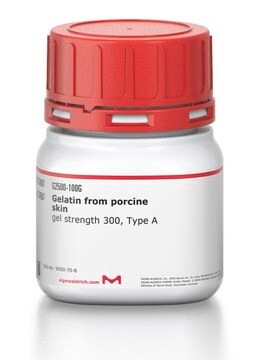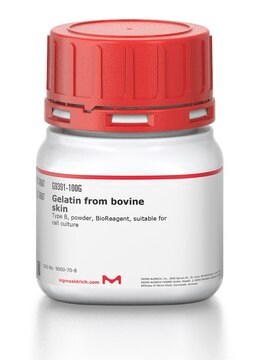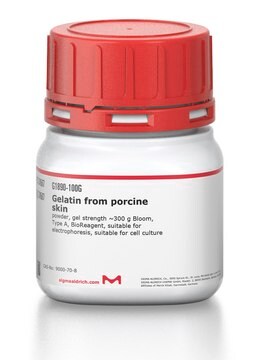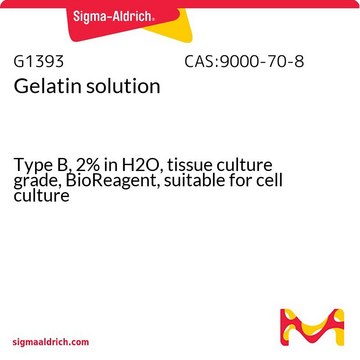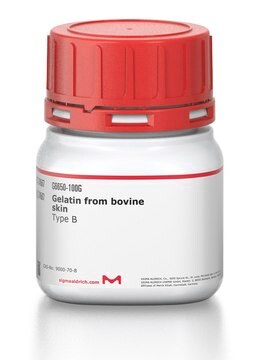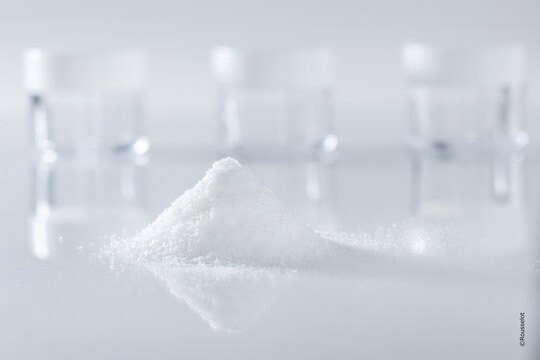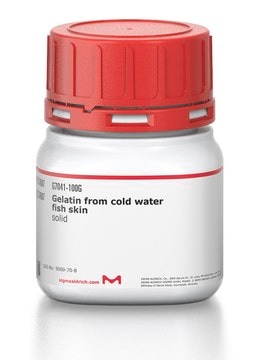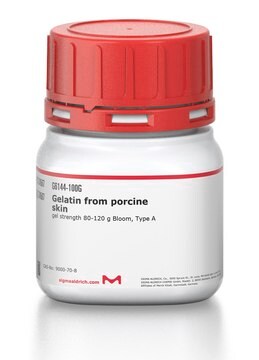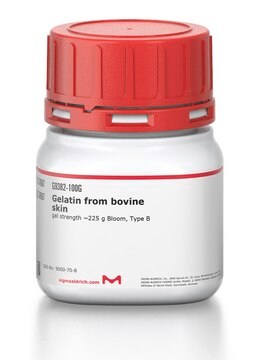918644
Low endotoxin gelatin solution
gel strength (bloom 300)
Sinônimo(s):
Type A, Bloom 300
Faça loginpara ver os preços organizacionais e de contrato
About This Item
Código UNSPSC:
12352202
NACRES:
NA.23
Produtos recomendados
forma
viscous liquid
Nível de qualidade
concentração
20 wt. % in DPBS (buffer)
Impurezas
<25 EU/mL Endotoxin
<5 cfu/mL Bioburden
cor
colorless to pale yellow
pH
6.5-7.5
temperatura de armazenamento
2-8°C
Aplicação
Low endotoxin gelatin solution is a 20% low endotoxin gelatin solution in DPBS buffer. It is sterile filtrated through 0.2 μm sterile filter, and ready to be used in biomedical applications.
Gelatin is widely used for tissue engineering and 3D bioprinting. Gelatin is derived from natural extracellular matrix (ECM) components. Due to its low cost, abundance, and retention of natural cell binding motifs, gelatin has become a highly sought material for tissue engineering applications. Gelatin solution has thermoreversible gelling property which enables synthesis of biocompatible and biodegradable hydrogels and promote cell adhesion, spreading, and proliferation.
Gelatin is widely used for tissue engineering and 3D bioprinting. Gelatin is derived from natural extracellular matrix (ECM) components. Due to its low cost, abundance, and retention of natural cell binding motifs, gelatin has become a highly sought material for tissue engineering applications. Gelatin solution has thermoreversible gelling property which enables synthesis of biocompatible and biodegradable hydrogels and promote cell adhesion, spreading, and proliferation.
Embalagem
10 mL in glass bottle
Código de classe de armazenamento
10 - Combustible liquids
Classe de risco de água (WGK)
WGK 3
Escolha uma das versões mais recentes:
Certificados de análise (COA)
Lot/Batch Number
Lamentamos, não temos COA para este produto disponíveis online no momento.
Se precisar de ajuda, entre em contato Atendimento ao cliente
Já possui este produto?
Encontre a documentação dos produtos que você adquiriu recentemente na biblioteca de documentos.
J M Harlan et al.
Laboratory investigation; a journal of technical methods and pathology, 48(3), 269-274 (1983-03-01)
Lipopolysaccharide (LPS) produced time- and dose-dependent bovine endothelial cell injury in vitro that was manifested initially by cell detachment from culture substrate with subsequent cell lysis. Bovine endothelial cell injury was observed with LPS derived from Salmonella minnesota R595, a
Nossa equipe de cientistas tem experiência em todas as áreas de pesquisa, incluindo Life Sciences, ciência de materiais, síntese química, cromatografia, química analítica e muitas outras.
Entre em contato com a assistência técnica